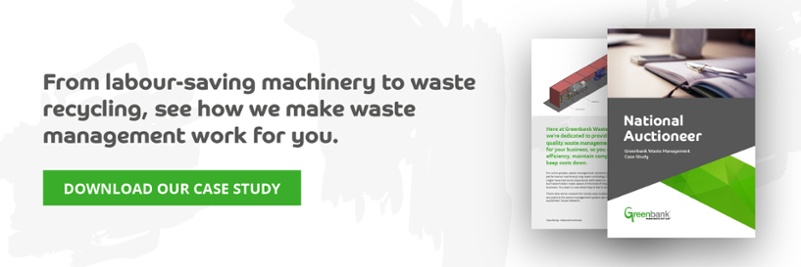It’s not easy to check the performance or ROI of your sustainability efforts. How can you truly determine how ‘green’ you’re being? You can see how much you might be saving with a certain waste contractor or by investing in waste management machinery, but without goals to follow you could be left confused about your progress.
Setting goals provides a positive framework from which to implement beneficial change. If you’re looking to create some sustainable waste management goals to help ‘green’ up your business, look no further. Here are our three tips for creating the goals of waste management.
1. Audit Your Site
Without analysing and understanding your site as it is currently, you won’t be able to create the relevant goals needed to solve any issues you’re experiencing. Begin by implementing a site audit, reviewing your waste and/or recycling policies and practices.
This needs to be developed by targeting the granular detail – not simply how many recycling bins are on-site, but what kind of waste is being generated, what percentage of it is recyclable and how much is actually being recycled.
For example, a retailer may produce a large amount of cardboard, polystyrene and polythene. Large retailers might be creating a vast amount of these waste types each month, which can have adverse effects on cleanliness and safety if improperly managed. This can also cause high waste disposal costs in terms of both collection, skip hire and landfill use.
When targeting either a zero-waste management policy or simply a much more effective waste disposal process, this is where to begin, by using this data to create your goals. You can also influence any stakeholders to do the same, so that:
- You can discover whether they are the right partners (for example, suppliers) for you.
- You can potentially influence them to audit their own work, helping the supply chain as a whole become more transparent and sustainable, which helps to increase compliance with any corporate social responsibility (CSR) policies in place.
Green corporate responsibility extends far beyond the confines of your business, so your supply chain should reflect that. Furthermore, creating goals not only gives you a framework to proceed from, but also incentivises your employees. Committing to sustainable waste management goals only captures true efficiency when everyone is on board.
2. Manage Your Waste Through SMART Goals
When talking about SMART goals, we mean goals that are:
- Specific.
- Measurable.
- Attainable.
- Realistic.
- Timely.
This means they need to fit the specific contexts of your working environment and not be ‘up in the air’. An example of a SMART goal for a business looking to reduce the waste collections could along the lines of:
Investing in a semi-automatic baler (specific) to decrease the volume of waste collections (measurable). From time of implementation, we shall record the volume of waste and the cost of waste collection over the year (timely) to see how much has been saved.
This kind of goal is both attainable and realistic, relying on a clear path towards a measurable ROI. The method for creating SMART goals could also be applied to your recycling and waste reduction policies. It can help to reduce your costs through landfill avoidance, reduced CO2 emissions from fewer collection trips and even new revenue streams from recycled materials, such as polystyrene.
3. Create Buy-In and Consumer Support
Sustainable waste management and sustainability as a whole can only be supported by the whole business, but it also helps to have support from your customers as well. You can first work to help each department understand your goals and targets, including how they’re going to be tracked and measured. Similarly, make it widely known what kind of benefits the business stands to gain.
You can work to include your waste goals and management policies within job descriptions, employee contracts and within the wider infrastructure of the business. Implementing these kinds of policies from the ground up can also help your business become more marketable to an increasingly environmentally-conscious consumer base.
People like to see businesses doing their part to limit their environmental impact. It’s been said that sustainability is a huge business opportunity, alongside not only attracting new eco-conscious customers, but eco-conscious talent as well.
A good sustainability policy with sustainable waste management goals can be a powerful marketing tool, enhancing your brand as a thought leader for the next generation of customers.
Publicising your green efforts can become a regular part of your communications process, including your measurable changes to really wow potential customers. When you get the feedback you’ve been wanting, as well as the increase in business, you’ll see that it only further incentivises your staff.
To help you understand what a sustainable waste management policy looks like firsthand, you can explore a case study on one of our recent implementations. We helped one of the UK’s leading auction house networks to set their own waste management goals while completely improving how they managed their waste.
Explore Our Waste Management Case Study Today
Every business needs a proper waste management policy and can suffer greatly from operational inefficiency if there’s isn’t good enough. Here at Greenbank, we help businesses deal with their waste through proper policy, reduction techniques and machine implementation.
To see how we were able to transform the waste management policies of the aforementioned auction house network, simply click the banner below.

Recommended Machinery
Recommended Guides




